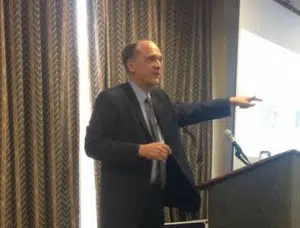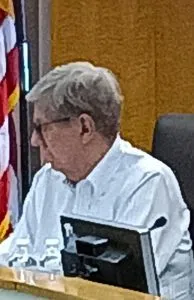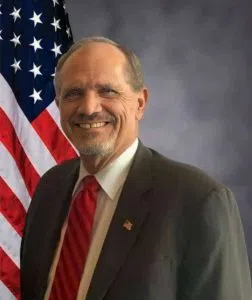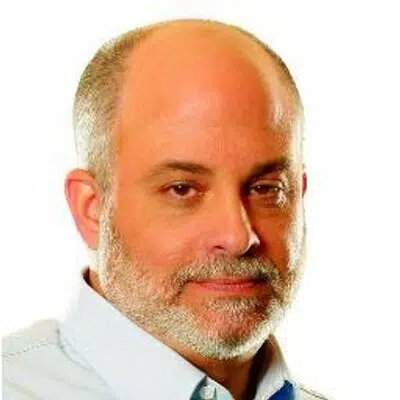
David Shestokas is a Constitutional Attorney representing Respondent Kathy Siracuse in proceedings responding to Objector Patrick Dullard who filed a challenge to petitions filed by Citizens For a Better Normal to put a referendum on the ballot to divide Normal into six districts for the purpose of electing its council members.
At Monday afternoon’s continuation of a hearing that began Monday August 22nd, Shestokas showed his skills and expertise as he spoke for Siracuse quoting case laws and providing the history of applicable laws as he argued against Dullard’s objections.
The Normal Electoral Board is made up of; Mayor Chris Koos, Senior Council Member Kevin McCarthy and City Clerk Angie Huonker. Brian Day, Town Attorney was appointed by Koos to serve on the board as attorney and parliamentarian.
Koos attempted to focus Monday’s hearing on four subjects.
- Whether Normal is a Town or a Village,
- The Objector’s General Objection to Signatures,
- If Signature Gatherers Must Be Normal Residents and
- If the Town Clerk Can Strike Petition Signatures For Cause.

Shestokas objected saying a motion he had made to dismiss or strike should be handled first.
In his original objection to the the petition signatures Dullard had argued that because Normal is a town petitioners had no right to petition. Dullard’s argument is that petitions for ballot referendums can only be circulated in villages.
Shestokas went to work. He explained that Supreme Court Cases since 1877 have ruled the terms are interchangeable. He also stated the last time this was argued before the IIliinois Supreme Court was 1910 and that therefore it is now settled law.
Shestokas then laid out a second argument regarding the differences between Illinois law which recognizes cities, towns and villages.
Cities have to go through an incorporation process. Normal has never done this, so it is not a city. Towns since 1985 have been required to elect a President and certain other officers. Normal has never elected these particular officers and if it is a town it has been operating illegally since 1985. Therefore, no matter what Normal identifies itself as, legally, it is a village.
The second matter Shestokas decided should be addressed was Dullard’s claim that there were not enough signatures.
Shestokas claimed that statutes require the objector to state his opposition to particular signatures or sheets of signatures and state the reason for the objection to each signature or sheet of signatures at the time the objection is filed. General or “Shotgun” objections are not acceptable.

Therefore there were no signatures to be checked during the records check that was done on Friday and the Electoral Board should not have scheduled such a record search on Monday the 22nd for Friday, according to Shestokas. Dullard should have reviewed the records before filing his objection.
Shestokas also argued that to do a records check after filing of the objection an amendment would have been needed and that no amendments are allowed in this process.
Shestokas went ahead and argued the objection by Dullard regarding petition circulators being from out of town saying the requirements for circulators are only that they be 18 years old and a US citizen.
Regarding the town clerk deciding to strike signatures because she believed some person’s who signed the petitions are not allowed to vote in Normal, Shestokas said that since he is arguing that the records check should have never happened when this occurred and he is asking for dismissal there was no need to argue the point further at this time.
The Normal Election Board took everything under advisement and adjourned the hearing a second time calling for it to reconvene at 7:00 p.m. tonight.










